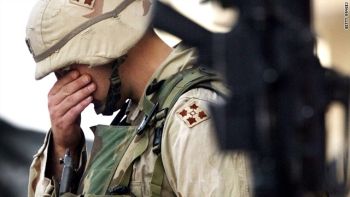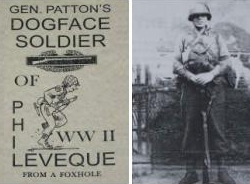
Publisher:
Bonnie King
CONTACT:
Newsroom@Salem-news.com
Advertising:
Adsales@Salem-news.com

~Truth~
~Justice~
~Peace~
TJP
Feb-17-2011 14:31

 TweetFollow @OregonNews
TweetFollow @OregonNews
PTSD, Grief/Anguish, Therapy/Catharsis: Time Magazine Prints Good News About Grief
Dr. Phil Leveque Salem-News.comThe VA shrinkologists call PTSD depression which it usually is not. Anguish or maybe profound grief from the loss of close buddies or direct damage to the soul.
 Courtesy: coalitionforveterans.org/ |
(MOLALLA, Ore.) - The most common injury of combat of those still alive is PTSD.
It is probably most certain that many Purple Heart veterans had/have PTSD also. The Purple Heart means they suffered bleeding injury. For the rest of us, the mental injury causing PTSD is most often worse.
Time magazine’s article intones the five stages of grief from Kubler-Ross’s book On Death and Dying as “denial, anger, bargaining, depression/(anguish), and acceptance” I relate to this as an accidental expert on PTSD in myself and combat veterans. I will hasten to admit that there are many other causes of PTSD. Search PTSD Leveque. I am certainly not dismissing other causes.
Loss of a spouse or child certainly causes PTSD and I cannot argue much with Kubler-Ross but the horror and terror of combat certainly qualifies for the damage and death of the soul caused by combat at the front. She seemed to base her book, as a psychiatrist, on the death and grief caused by WWI for her best selling book which was as much about her patients as her own experience of facing her own death. The book comprises interviews with those who were facing imminent death. As far as I am concerned imminent death is the factuality of being a Combat Infantryman. Most of us KNEW we could not survive. In WWII, 300,00 of about 1,000,000 Combat Infantrymen were killed. Other wars had similar casualties.
Kubler-Ross’s book engendered a new psychological specialty, grief counseling. We now have a split off branch of PTSD counselors mostly in VA hospitals to aid the 1,000,000 or so PTSD victims.
The VA shrinkologists call PTSD depression which it usually is not. Anguish or maybe profound grief from the loss of close buddies or direct damage to the soul. We were not really allowed any time off for grief after a battle, maybe a few hours and a smoke at best.
The Army experience of prolonged terror and loss of buddies was that maybe a Combat Infantryman could last about 200 days before he psychologically fell apart. This has been brought home to us in our current wars which have caused about 30% or 1,000,000 PTSD casualties.
The Army and the VA et cetera have failed miserably in treating these victims. Anti-depressant drugs have mostly been a complete failure although some have helped a few. Strong painkillers enabling sleep and escape from severe nightmares work somewhat but cause addiction. Anti-anxiety drugs, anti-psychotic drugs, and anti-epilepsy drugs help some but most drugs of all classes have serious adverse side effects which cause the PTSD victims to stop their use and revert to the “poor mans tranquilizer” – alcohol, which causes more deaths than battle.
According to TIME Magazine “the latest research indicates that grief (PTSD) is not a series of steps but rather a grab bag of symptoms that come and go and, eventually, simply lift”. Well, maybe slightly!
MOST COMBAT SOLDIERS HAVE CRIED IN GRIEF, RAGE AND FRUSTRATION!!!
Below stories are again current topics:
Oct-16-2008: Military Rape: S O P (Standard Operating Procedure)NOT OUR BOYS!Dr. Phillip Leveque Salem-News.com
Dec-04-2010: Women Veteran Suicides: Is this SOP (Standard Operating Procedure)? - Dr. Phil Leveque Salem-News.com
Dr. Phillip Leveque has degrees in chemistry, biochemistry, pharmacology, toxicology and minors in physiology and biochemistry. He was a Professor of Pharmacology, employed by the University of London for 2 years, during which time he trained the first doctors in Tanzania. After training doctors, he became an Osteopathic Physician, as well as a Forensic Toxicologist.


Email him: ASK DR. LEVEQUE
More information on the history of Dr. Leveque can be found in his book, General Patton's Dogface Soldier of WWII about his own experiences "from a foxhole". Order the book by mail by following this link: DOGFACE SOLDIER OF WWII If you are a World War II history buff, you don't want to miss it.
Articles for February 16, 2011 | Articles for February 17, 2011 | Articles for February 18, 2011

Quick Links
DINING
Willamette UniversityGoudy Commons Cafe
Dine on the Queen
Willamette Queen Sternwheeler
MUST SEE SALEM
Oregon Capitol ToursCapitol History Gateway
Willamette River Ride
Willamette Queen Sternwheeler
Historic Home Tours:
Deepwood Museum
The Bush House
Gaiety Hollow Garden
AUCTIONS - APPRAISALS
Auction Masters & AppraisalsCONSTRUCTION SERVICES
Roofing and ContractingSheridan, Ore.
ONLINE SHOPPING
Special Occasion DressesAdvertise with Salem-News
Contact:AdSales@Salem-News.com



Salem-News.com:
Terms of Service | Privacy Policy
All comments and messages are approved by people and self promotional links or unacceptable comments are denied.
[Return to Top]
©2026 Salem-News.com. All opinions expressed in this article are those of the author and do not necessarily reflect those of Salem-News.com.